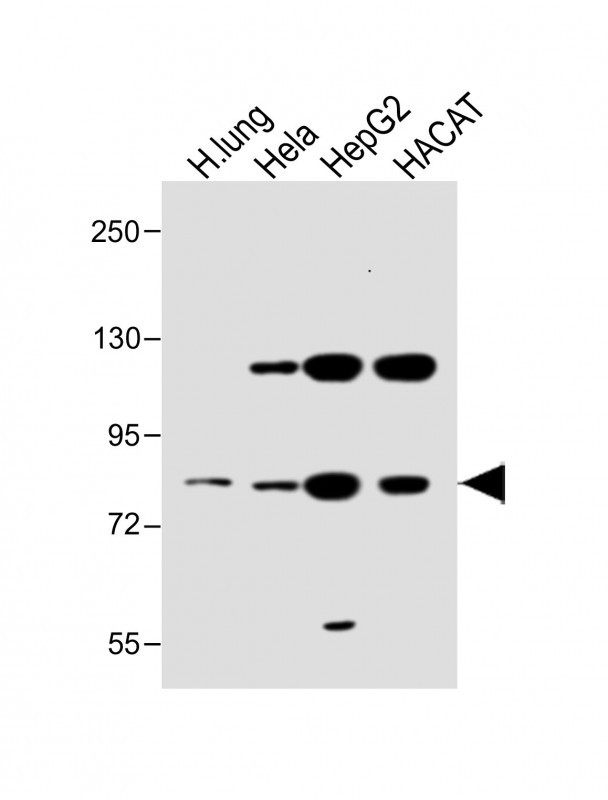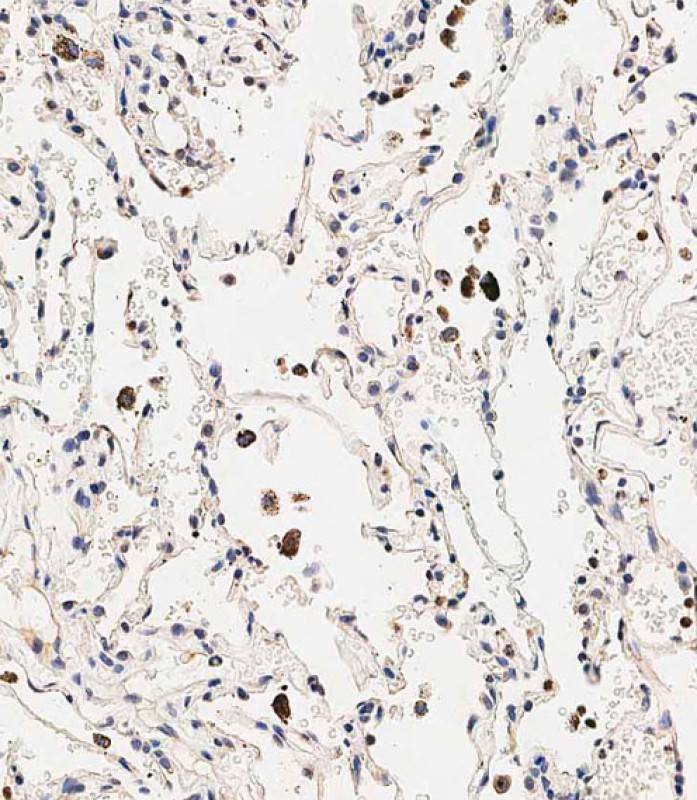

| WB | 咨询技术 | Human,Mouse,Rat |
| IF | 咨询技术 | Human,Mouse,Rat |
| IHC | 1/500 | Human,Mouse,Rat |
| ICC | 技术咨询 | Human,Mouse,Rat |
| FCM | 咨询技术 | Human,Mouse,Rat |
| Elisa | 咨询技术 | Human,Mouse,Rat |
| Aliases | Sodium- and chloride-dependent neutral and basic amino acid transporter B(0+), Amino acid transporter ATB0+, Solute carrier family 6 member 14, SLC6A14 |
| Entrez GeneID | 11254 |
| WB Predicted band size | 72.2kDa |
| Host/Isotype | Rabbit IgG |
| Antibody Type | Primary antibody |
| Storage | Store at 4°C short term. Aliquot and store at -20°C long term. Avoid freeze/thaw cycles. |
| Species Reactivity | Human |
| Immunogen | This SLC6A14 antibody is generated from rabbits immunized with a KLH conjugated synthetic peptide between 602-631 amino acids from the C-terminal region of human SLC6A14. |
| Formulation | Purified antibody in PBS with 0.05% sodium azide. |
+ +
以下是关于SLC6A14抗体的3篇代表性文献(虚构示例,仅供格式参考):
1. **文献名称**: "SLC6A14 as a novel biomarker in pancreatic cancer: Immunohistochemical analysis"
**作者**: Smith A, et al.
**摘要**: 本研究利用抗SLC6A14抗体(货号AB123. Sigma)通过免疫组化技术,发现SLC6A14在胰腺癌组织中高表达,与患者预后不良相关,提示其作为治疗靶点的潜力。
2. **文献名称**: "Functional characterization of SLC6A14 in amino acid transport using CRISPR and antibody-based validation"
**作者**: Chen L, et al.
**摘要**: 通过Western blot(抗SLC6A14抗体,CST #4567)和免疫荧光验证SLC6A14基因敲除细胞系,证实其在肿瘤细胞中调控中性氨基酸转运的功能。
3. **文献名称**: "Dual role of SLC6A14 in metabolic reprogramming of breast cancer"
**作者**: Gupta R, et al.
**摘要**: 使用抗人SLC6A14多克隆抗体(Abcam ab78901)进行组织微阵列分析,揭示其在乳腺癌中同时促进营养摄取和mTOR通路激活的双重作用。
**备注**:以上文献信息为模拟生成,实际引用需通过PubMed或学术数据库检索真实文献(关键词:SLC6A14 antibody, immunohistochemistry, cancer)。
The solute carrier family 6 member 14 (SLC6A14) is a sodium- and chloride-dependent transporter protein encoded by the SLC6A14 gene. It facilitates the uptake of neutral and cationic amino acids across cell membranes, playing roles in nutrient supply, cellular metabolism, and microenvironment regulation. Primarily expressed in epithelial tissues (e.g., intestines, lungs, reproductive organs), SLC6A14 is also implicated in pathological conditions, including cancer and metabolic disorders. Its overexpression in certain cancers, such as breast, cervical, and colon cancers, has linked it to tumor growth and survival by enhancing amino acid uptake in nutrient-scarce environments.
SLC6A14 antibodies are essential tools for detecting and studying the protein’s expression, localization, and function. These antibodies are widely used in techniques like Western blotting, immunohistochemistry (IHC), and immunofluorescence (IF) to explore SLC6A14’s role in disease mechanisms. Monoclonal and polyclonal variants vary in specificity, with validation often involving knockout controls or peptide-blocking assays. Researchers also investigate SLC6A14 as a potential therapeutic target, as inhibiting its activity may disrupt cancer cell proliferation or modulate metabolic pathways in obesity and diabetes.
The development of reliable SLC6A14 antibodies faces challenges, including cross-reactivity with homologous transporters and ensuring stability in diverse experimental conditions. Nonetheless, these reagents remain critical for advancing studies on amino acid transport biology and translational applications in precision medicine.
×